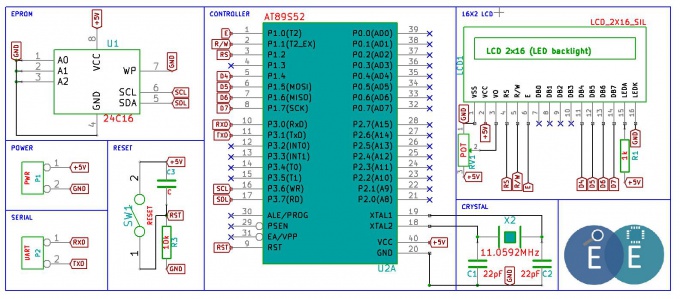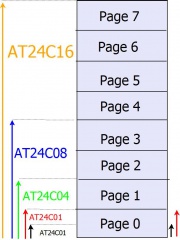Difference between revisions of "A6b:8051 Interfacing: EEPROM AT24C16"
| Line 30: | Line 30: | ||
|- | |- | ||
|} | |} | ||
| + | Note the following from the memory map. | ||
| + | * Each page requires 8-bits to to access the 256 locations | ||
| + | * Additional 3 bits are required to address 8 pages | ||
| + | * Hence 13 bits are required to address the entire 16K Memory. | ||
[[File:Memory Table.jpeg|thumbnail|Memory Map: Each page is 256 Bytes]] | [[File:Memory Table.jpeg|thumbnail|Memory Map: Each page is 256 Bytes]] | ||
Revision as of 13:25, 12 August 2014
Contents
Video Tutorial
Intro
In this tutorial we will interface the EEPROM IC 'AT24C16' with 8051. AT24C16 works on I2C protocol, hence it is recommended to go through the I2C/TWI Basics tutorial first. AT24C16 has 16K bits of EEPROM Memory. This can be quite useful when your project needs some kind of permanent storage in real time. Say, you want to read some sensor, keep count, time and want these values to be stored, and retrieve them even if the unit is turned off and turn ON back again! You need an EEPROM then, because 8051 does not have on built in! <br\>
Schematic
The schematic is pretty simple, you could connect the I2C lines to any of the two 8051 port pins, because the 8051 does not have in built hardware to handle I2C communication, we need to 'bit-bang' it. For this tutorial we have made connections as shown in the image below, also notice the character LCD in 4 bit mode. So what we do in this tutorial is write some strings to the EEPROM and read them back.
The AT24C16
The AT24C16 is one variant of AT24C series others are AT24C01, AT24C02,AT24C04,AT24C08, the tutorial should hold good for all of these. Table below show memory arrangement for all of these
| IC | Memory Size | Page Numbers |
|---|---|---|
| AT24C01 | 1K Bits(128 Bytes) | 0 |
| AT24C02 | 2K Bits(256 Bytes) | 0 |
| AT24C04 | 4K Bits(512 Bytes) | 0 to 1 |
| AT24C08 | 8K Bits(1024 Bytes) | 0 to 3 |
| AT24C16 | 16K Bits(2048 Bytes) | 0 to 7 |
Note the following from the memory map.
- Each page requires 8-bits to to access the 256 locations
- Additional 3 bits are required to address 8 pages
- Hence 13 bits are required to address the entire 16K Memory.


